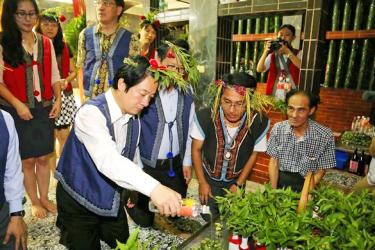Pingpu recognized under Act for Indigenous Peoples
SUPERFICIAL TITLE:Pingpu campaigners said that a new classification was not what they had fought for, and that they fear the CIP might stall on Aboriginal rights issues
By Jason Pan / Staff reporter
The government yesterday approved a proposal to recognize Pingpu Aborigines as indigenous peoples, by amending the Status Act For Indigenous Peoples (原住民身分法) to restore their identity, and linguistic and cultural rights, in accordance with a policy of transitional justice advanced by President Tsai Ing-wen (蔡英文).
The decision to create a new community, known as Pingpu Indigenous People, was announced yesterday by the Executive Yuan following a meeting on policies and status laws regarding Pingpu communities, with deliberations by government officials, academics and representatives of Pingpu communities.
Some Pingpu leaders welcomed the news, hailing it as a “historic decision” for the government to finally recognize Pingpu communities as Taiwanese indigenous peoples, adding that it would open a new era for justice and equality for all the major ethnic and cultural groups in Taiwan.
“We are very happy that the Executive Yuan pushed forward on this policy. It is time for Pingpu communities to regain their indigenous status, which they had possessed in the past. On behalf of the Pingpu Siraya community in Tainan City, I want to thank the central government for respecting the right to self-identity and for the recognition of their indigenous status,” Tainan Mayor William Lai (賴清德) said. “This is the first time we have had a positive response from the government on this issue, after decades of struggling and campaigning.”
“However, there is more work to do to promote the cultural identities and traditions of Pingpu communities to restore and protect their rights the same as those of other recognized indigenous peoples,” he added.
Other Pingpu campaigners said that there are still protracted negotiations and hard bargaining to be done with the Council of Indigenous Peoples (CIP) in the years to come, as the proposal requires an itemized examination of the Indigenous Peoples Basic Act (原住民族基本法) on affected rights and applications of Pingpu communities, after the process of amending the Status Act For Indigenous Peoples (原住民身分法).
There has been opposition to the recognition of some Pingpu communities as indigenous peoples to limit their privileges and rights, and government subsidies given to 16 of the recognized Aboriginal groups, activists said.
Pingpu Papora youth campaigner Aidu Mali from central Taiwan said her youth organization has been deliberately excluded from meetings between the Executive Yuan and the CIP over the past year.
“The proposal to create another category as ‘Pingpu Indigenous People’ was not what we fought for. It only gives us a superficial title and we fear that the CIP will work hard to stall on granting any indigenous rights. In the end, we could be denied our rights and excluded from the system again,” she said.
Ketagalan community Pingpu rights campaigner Chen Kimman (陳金萬) said that although he welcomed the development, he also warned that CIP officials, in their own self-interest, had chosen not to grant indigenous status to Pingpu communities, but had deliberately drawn out the process with legal amendments and protracted negotiations, which could drag on for many years and could be impeded by politicians and special-interest groups.

No comments:
Post a Comment